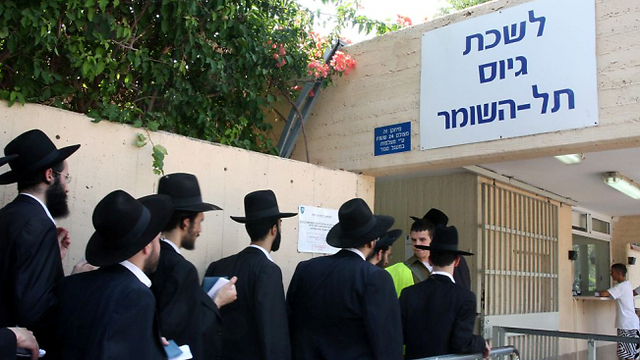
Comptroller points to inadequate medical treatment for IDF soldiers
While examining the IDF practices in regard to potential recruits and current soldiers, State Comptroller Shapira discovers long waiting lines before treatment, sweeping exemptions for the ultra-Orthodox and unsatisfactory minefield clearing.
State Comptroller Yosef Shapira documented inadequate medical services provided to IDF soldiers in his annual report released Tuesday, also shedding light on the ease with which ultra-Orthodox men can receive exemptions by declaring themselves mentally unable to serve.
Approximately 300 of the 1,901 pages in the 67th annual report are devoted to the Ministry of Defense and the IDF. One of the subjects the report deals with is the serious flaws it found in the medical service offered to soldiers in mandatory service.
"Many soldiers go through 'suffering' when they seek medical care, from the difficulty of scheduling an appointment with a doctor by phone, to long waiting times for the appointment. These situations could lead to some soldiers not receiving the medical treatment they need," retired judge Yosef Shapira wrote.
In January 2011, the IDF launched a new plan to privatize and outsource medical services to soldiers serving in two of its major Tel Aviv area bases—the Kirya IDF headquarters and the Tel HaShomer base. A considerable number of the military clinics in those bases were closed and the treatment was entrusted to private clinics belonging to health maintenance organizations (HMO).
A year later, the army also outsourced emergency medical care to the private company Bikur Rofeh, which provided medical care to soldiers after hours when HMO clinics were closed.
However, the IDF decided to roll back the reform in November 2014, returning care of soldiers back to the military clinics.
The state comptroller found that the reform's rollback impaired the availability of primary medical services to soldiers in the two major bases. Soldiers found it difficult to reach the clinics by phone, especially in the morning, with many soldiers giving up before speaking to a representative.
The comptroller also found that the average waiting period for an elective procedure was two to three weeks long. Combat and non-combat soldiers had to wait for an appointment with a specialist for much longer than the standard set by the Chief Medical Officer, which is 14 days on average for a combat soldier and 21 days on average for other soldiers. Thirty-two percent of soldiers who were referred to a specialist noted that they waited two to four weeks for an appointment, while 30 percent indicated that they had to wait longer.
The comptroller further found that in 2014 and 2015, military doctors failed to follow up on 58 and 64 percent (respectively) of referrals, running the risk the medical problem could worsen if allowed to go unchecked.
The comptroller noted soldiers were having difficulty setting appointments with mental health professionals as well, with over 16 percent of soldiers waiting more than four weeks for such an appointment. Furthermore, referrals for psychiatric examination were incorrectly entered into the database, making it difficult to ensure that all the patients referred to a psychiatrist were properly treated.
Special treatment for the ultra-Orthodox
Shapira found that prospective ultra-Orthodox recruits received 2.5 to three times more exemptions from military service for mental reasons than the rest of the population.
From March to July 2014, 1,094 Haredi yeshiva students arrived at the IDF induction centers, with more than half of them (607) of them receiving a recommendation for exemption from service due to mental reasons. From January to October 2015, 77 percent received the same recommendation.
The Chief Medical Officer told the comptroller's representative that "the difficulty stems from the fact prospective recruits who are not interested in enlisting get the entire 'establishment' to help them—their family, their teachers and their doctors. In such a situation, the mental health professionals cannot prove whether they are pretending."
The comptroller wrote that even though the IDF has been aware of this "loophole" since 2012, it has yet to find a solution.
IDF responds to the report
The IDF Spokesperson's Unit responded to the comptroller report's various criticisms of its conduct and policies.
On the long waiting times soldiers experience to set a doctor's appointment, the IDF said that "it should be noted that despite the fact there is no binding procedure in Israel for a preliminary medical appointment, the Chief Medical Officer, Brig. Gen. Dudu Dagan, decided that the maximum waiting period for non-urgent doctor appointments would be seven days." It added that "to reduce the long waiting times, the phones are manned at 110 percent capacity.
"The Medical Corps operates in a number of ways to improve waiting times for specialists and is committed to providing optimal medical treatment to all soldiers in all positions. Moreover, soldiers in combat units have a quota of designated lines reserved for them."
On the "loophole" taken advantage by ultra-Orthodox men to obtain exemptions, the IDF said that "the issue of enlisting ultra-Orthodox recruits is a significant challenge not only from the mental health perspective, but in general. The IDF is looking at different alternatives for incorporating Haredim into the army, including on the mental health level."











